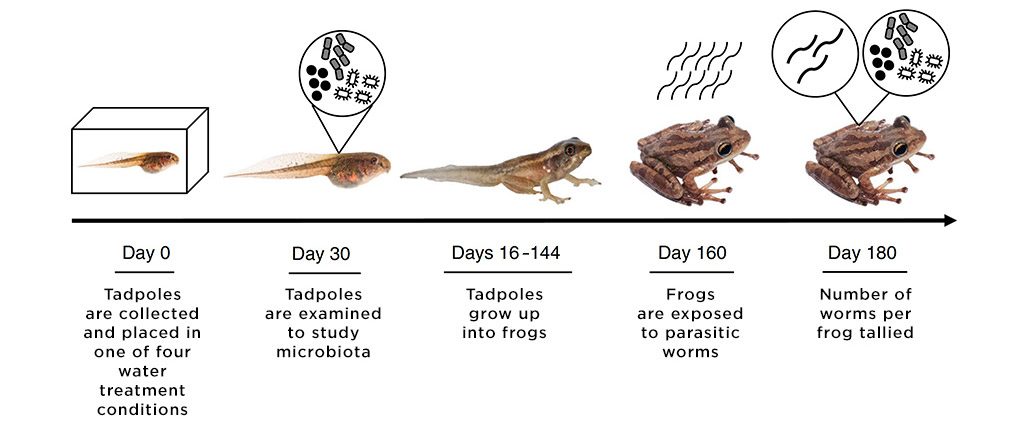Biologists at the University of Connecticut and University of South Florida have found that a crucial window in the development of tadpoles may influence a frog’s ability to fight infectious diseases as an adult.
The scientists showed that an early-life disruption of the gut and skin bacterial communities of tadpoles later affects the adult frogs’ ability to fight off parasitic gut worms. Led by Sarah Knutie of UConn, the team published its findings in the July 20 edition of Nature Communications.
The abundance of certain bacteria in juveniles was linked to parasite resistance in adulthood.
“Our study found that a disruption of bacteria in tadpoles has enduring negative effects on how adult frogs deal with their parasites,” Knutie said. “These results suggest that preventing early-life disruptions of bacteria by factors such as nutrition, antibiotics, and pollution, might confer protection against diseases later in life.”
The project is significant not only for the insight it provides in threats to the health of the world’s frogs, but in its potential applicability to understanding the immune systems of mammals and even humans.
The impact of a healthy bacterial community in the gut is an increasing focus of scientists looking to understand a wide range of ailments in many species, including humans. Previous research has found that an early-life disruption of the gut microbiota in mammals can result in a hyper-reactive immune system that may increase the subsequent risk of immune-related health issues, such as allergies and autoimmune diseases.

In their experiments, the scientific team manipulated the bacterial communities of Cuban tree frog tadpoles and then exposed them to parasites later in life. The tadpoles were either raised in natural pond water or one of three other treatments to manipulate the bacterial communities: sterile pond water, sterile pond water with short-term antibiotics, or sterile pond water with long-term antibiotics.
Adult frogs that had reduced bacterial diversity as tadpoles had three times more parasites than adults that did not have their microbiota disrupted as tadpoles, the study found. Those results suggest that preventing early-life disruptions of host-associated bacterial communities might reduce infection risk later in life.
“We think that the microbiota of juveniles likely played a role in priming the immune system against parasite establishment,” the researchers wrote. “We found that the relative abundance of certain bacteria … in juveniles was positively correlated with parasite resistance in adulthood.”
Knutie began the research as a postdoctoral researcher at the University of South Florida, and recently joined the UConn faculty.
The project was funded by the National Science Foundation, the British Ecological Society, the National Institutes of Health, the U.S. Department of Agriculture, and the Environmental Protection Agency.
Read the article here.



